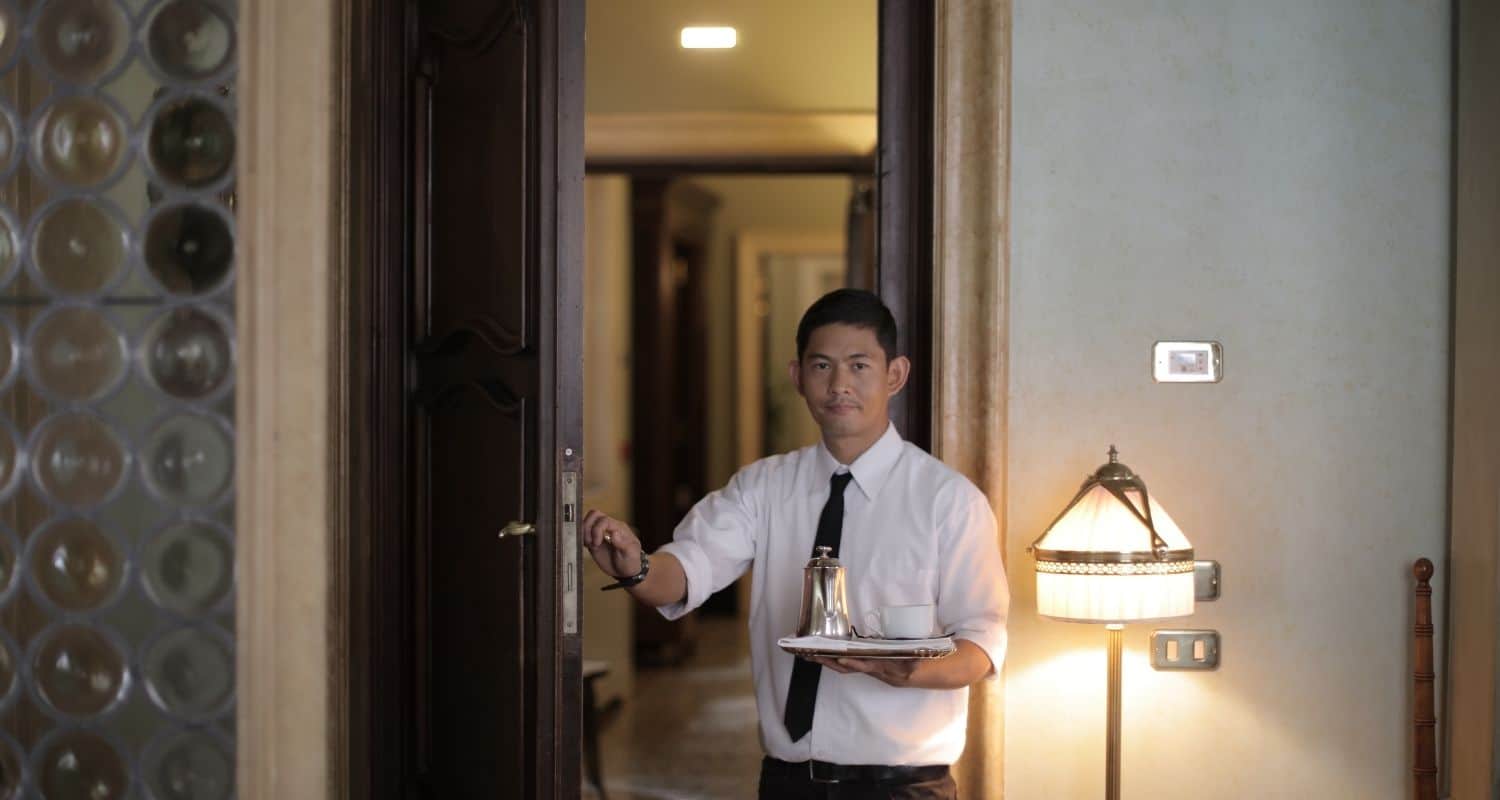Can Hotel Staff Enter Your Room Without Permission?
Have you ever wondered if hotel staff can enter your room without your permission? It’s a common concern for many travelers, as privacy and security are paramount when staying in a hotel. Whether you’re on a business trip or a leisure vacation, the last thing you want is an unexpected intrusion into your personal space.
If you’re short on time, here’s a quick answer to your question: Hotel staff generally cannot enter your room without permission, except in certain circumstances such as emergencies, maintenance issues, or when the room is being checked out.
In this comprehensive article, we’ll delve into the details of when hotel staff can and cannot enter your room, the policies and procedures they must follow, and your rights as a guest. We’ll also explore the potential consequences of unauthorized entry and provide tips on how to ensure your privacy and security during your stay.
Hotel Policies and Procedures
Room Entry Guidelines
Most hotels have strict policies regarding room entry by staff members. As a general rule, hotel staff cannot enter your room without your permission or consent, except in specific circumstances. This policy is designed to protect your privacy and ensure a comfortable stay.
Typically, hotel staff will only enter your room for housekeeping services during designated times or when you’ve requested it. They are required to knock and announce themselves before entering. If there’s no response, they are not permitted to enter.
Some hotels even have “Do Not Disturb” signs or systems that guests can use to indicate their preference for privacy.
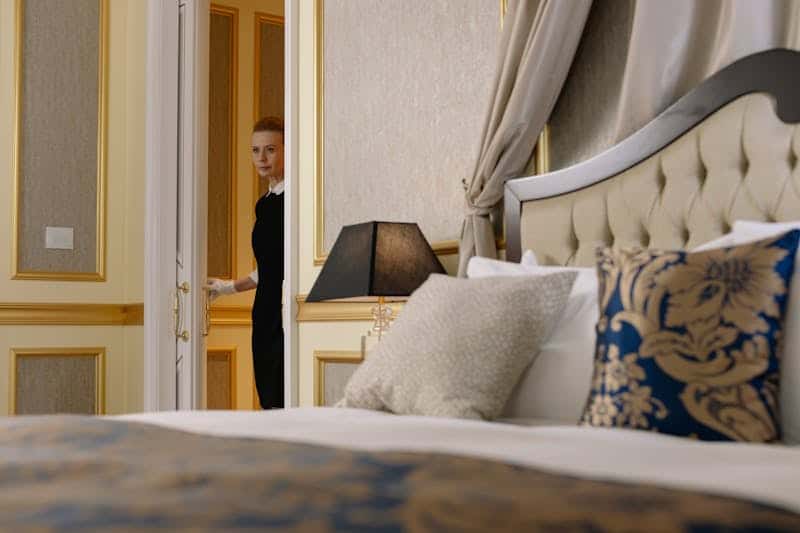
Exceptions for Emergencies and Maintenance
While guest privacy is a top priority, hotels do reserve the right to enter rooms without prior consent in certain situations. These exceptions are usually outlined in the hotel’s policies and terms of service.
For instance, if there’s a fire or other emergency that poses a risk to safety, hotel staff may need to enter rooms to evacuate guests or address the situation.
Another common exception is for maintenance or repair purposes. If a guest reports a plumbing issue, broken appliance, or other problem that requires immediate attention, hotel staff may need to enter the room to resolve the issue.
In these cases, they will typically make an effort to notify the guest in advance or obtain consent whenever possible.
Notification and Consent Requirements
To protect guest privacy, hotels often have strict notification and consent requirements for room entry. Hotels should clearly disclose their policies regarding room entry and obtain consent from guests whenever possible. This consent may be obtained through written policies, verbal agreements, or electronic means.
Some hotels go a step further by implementing advanced notification systems. For example, they may send a text message or call the guest’s room before entering, or they may have a system that allows guests to grant or deny entry remotely. Additionally, many hotels require staff to leave a “We Missed You” card or other notification if they entered the room while the guest was away.
It’s important to note that hotel policies may vary based on location, brand, and other factors. As a guest, it’s always a good idea to review the hotel’s specific policies and procedures regarding room entry. If you have any concerns or questions, don’t hesitate to ask the front desk or management for clarification.
Guest Rights and Privacy Concerns
Legal Protections for Hotel Guests
As a hotel guest, you have certain legal rights and protections regarding your privacy and personal space.
According to an article published in the Seton Hall Circuit Review, hotel guests are afforded a reasonable expectation of privacy under the Fourth Amendment of the U.S. Constitution. This means that hotel staff cannot enter your room without your permission or a valid legal reason, such as an emergency situation or a court order.
Many states have also enacted laws that specifically address the privacy rights of hotel guests. In some states, it is unlawful for hotel staff to enter a guest’s room without proper notice or consent, except in cases of emergency or when the guest has checked out. Violating these laws can result in legal consequences for the hotel, including fines or lawsuits.
Reasonable Expectation of Privacy
As a hotel guest, you have a reasonable expectation of privacy during your stay. This means that you should be able to enjoy your room without unauthorized intrusions or disturbances from hotel staff. However, it’s important to note that this expectation of privacy is not absolute.
Hotel staff may need to enter your room for legitimate reasons, such as:
- Cleaning and maintaining the room
- Responding to emergencies or safety concerns
- Investigating potential criminal activity or violations of hotel policies
In these cases, hotel staff should provide proper notice and obtain your consent before entering, unless there is an immediate safety concern or legal requirement.
The majority of travelers consider privacy an important factor when choosing a hotel. This highlights the significance of respecting guest privacy and adhering to legal guidelines to maintain guest trust and satisfaction.
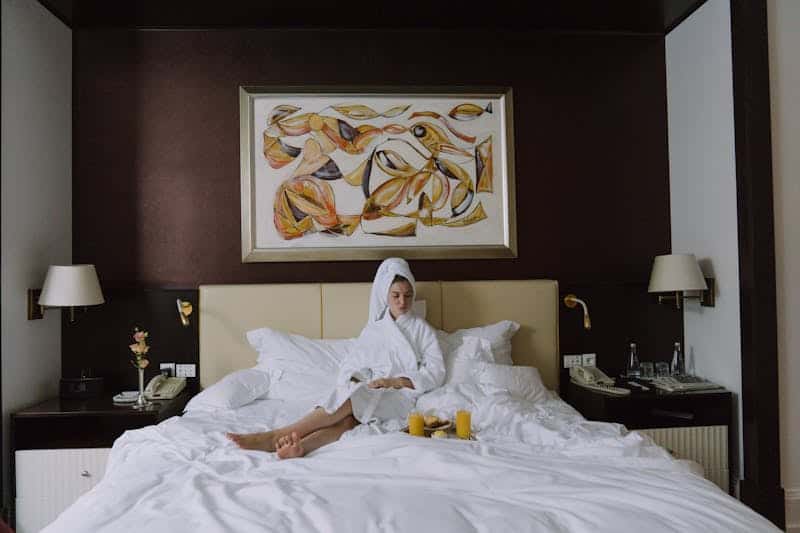
Potential Consequences of Unauthorized Entry
If hotel staff enter your room without proper authorization or consent, there can be serious consequences for both the staff members and the hotel itself. Unauthorized entry can be considered trespassing or invasion of privacy, which can lead to legal action and financial penalties.
In addition to potential lawsuits and fines, unauthorized entry can also damage the hotel’s reputation and lead to negative reviews and lost business. Many of customers will walk away from a brand after a single bad experience.
Respecting guest privacy and following proper protocols is crucial for maintaining a positive reputation and customer loyalty.
It’s important to note that if you suspect unauthorized entry or have concerns about your privacy during your hotel stay, you should immediately contact hotel management or local authorities to address the issue. Don’t hesitate to assert your rights and ensure that your privacy is respected throughout your stay.
Ensuring Your Privacy and Security
When staying at a hotel, it’s essential to prioritize your privacy and security. After all, your hotel room serves as a temporary home away from home, and you deserve to feel safe and comfortable within its walls.
Fortunately, there are several measures you can take to ensure your personal space remains undisturbed and your belongings remain secure.
Using the ‘Do Not Disturb’ Sign
One of the simplest yet most effective ways to maintain your privacy is by utilizing the “Do Not Disturb” sign provided by the hotel. This sign serves as a clear signal to the housekeeping staff and other hotel personnel that you do not wish to be disturbed during your stay.
By hanging this sign on your door, you can rest assured that your room will not be entered unless there is an emergency situation. Hotel guests feel more at ease when using the “Do Not Disturb” sign, as it allows them to relax and unwind without interruptions.
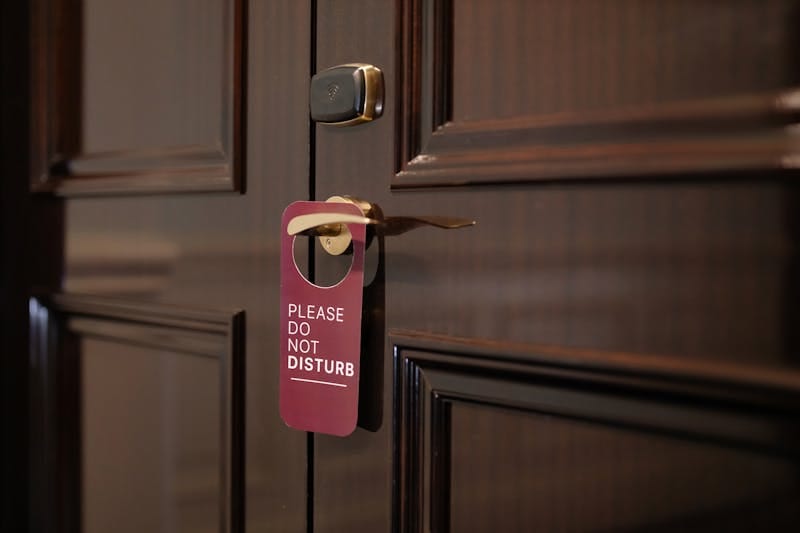
Securing Valuables and Personal Belongings
In addition to maintaining privacy, it’s equally crucial to safeguard your valuables and personal belongings. Many hotels provide in-room safes or safety deposit boxes at the front desk, where you can securely store items such as jewelry, cash, passports, and other important documents.
Furthermore, it’s advisable to keep your room locked at all times, even when you’re inside. This simple precaution can prevent unauthorized entry and potential theft. If you notice any suspicious activity or signs of tampering with your room’s lock, don’t hesitate to report it to the hotel management immediately.
Reporting Unauthorized Entry to Hotel Management
In the event that you suspect unauthorized entry into your room, it’s crucial to take immediate action. Contact the hotel management and report the incident, providing as many details as possible.
Reputable hotels take such matters very seriously and will conduct a thorough investigation to ensure your safety and privacy. It’s essential to remain vigilant and report any concerns promptly. By working closely with hotel staff, you can help maintain a secure and comfortable environment for all guests.
Remember, your privacy and security should be a top priority when staying at a hotel. By following these guidelines and being proactive, you can enjoy a stress-free and enjoyable experience during your travels.
Don’t let the fear of unauthorized entry ruin your well-deserved vacation or business trip – take the necessary precautions and rest easy, knowing that your personal space is protected.
Special Circumstances and Exceptions
Extended Stays and Long-Term Rentals
When it comes to extended stays or long-term rentals, such as those lasting a month or longer, hotels may have different policies in place regarding room entry. In these cases, the room essentially becomes your temporary home, and there may be more flexibility in terms of when staff can enter.
However, it’s still generally expected that the hotel will provide advance notice before entering, except in emergency situations. It is important to familiarize yourself with the specific policies for extended stays that outline guest privacy expectations.
Housekeeping and Maintenance Schedules
Most hotels have regular housekeeping and maintenance schedules that require staff to enter guest rooms periodically. This could be for daily cleaning, changing linens, or performing routine maintenance checks.
In these cases, hotels typically have established protocols for notifying guests in advance, such as placing a “Please Service Room” sign on the door or leaving a note under the door. While you can request that staff not enter during your stay, it’s important to remember that hotels have a responsibility to maintain a certain level of cleanliness and safety for all guests.
Emergencies and Safety Concerns
In the event of an emergency or safety concern, hotel staff may need to enter your room without prior notice. This could include situations such as a fire alarm, suspected gas leak, or if there is reason to believe a guest’s safety is at risk.
While these instances are relatively rare, they are considered exceptions to the general rule of requiring guest permission. It’s important to note that in these cases, staff are acting in the best interest of guest safety and following established protocols.
Ultimately, while hotels strive to respect guest privacy, there are certain circumstances where staff may need to enter your room without explicit permission. However, reputable hotels should have clear policies in place and strive to provide advance notice whenever possible.
If you have concerns about your privacy during your stay, it’s always best to discuss them with the hotel staff upfront. By understanding the exceptions and working together, both guests and hotels can ensure a safe and enjoyable experience for all.
Best Practices for Hotels and Guests
Staff Training and Awareness
Ensuring hotel staff are well-trained and aware of guest privacy policies is crucial for maintaining trust and professionalism.
To address this, hotels should implement comprehensive training programs that cover topics such as:
- Proper procedures for entering guest rooms (e.g., knocking, announcing presence)
- Respecting “Do Not Disturb” signs and guest preferences
- Handling sensitive situations with discretion and empathy
Regular refresher courses and role-playing exercises can help reinforce these principles and ensure staff remain vigilant in upholding guest privacy. A well-trained staff is the foundation for creating a comfortable and secure environment for all guests.
Clear Communication and Consent
Open and transparent communication between hotels and guests is essential for establishing boundaries and obtaining consent. During the check-in process, hotels should clearly outline their policies regarding room entry, including circumstances where staff may need to access the room (e.g., maintenance, cleaning).
Guests should also be informed of their right to refuse entry if they feel uncomfortable. 😊 Additionally, hotels can provide guests with the option to indicate their preferences for room service or housekeeping visits through in-room forms or digital platforms.
In situations where staff must enter a room, they should make every effort to obtain the guest’s consent beforehand. This could involve a phone call, text message, or even a knock on the door with a clear announcement of their presence.
By prioritizing open communication and respecting guest autonomy, hotels can foster a sense of trust and transparency that enhances the overall guest experience.
Respecting Guest Privacy and Boundaries
Ultimately, hotels must prioritize the privacy and boundaries of their guests above all else. This means strictly adhering to policies and procedures regarding room entry, even in non-emergency situations.
Staff should be trained to respect “Do Not Disturb” signs and refrain from entering rooms without explicit guest consent, except in cases of immediate safety concerns.
Furthermore, hotels should implement measures to safeguard guest information and personal belongings. This could include secure storage systems, limited access to guest records, and strict confidentiality protocols for staff.
By demonstrating a commitment to respecting guest privacy and boundaries, hotels can build a reputation for trustworthiness and create a welcoming environment for all guests.
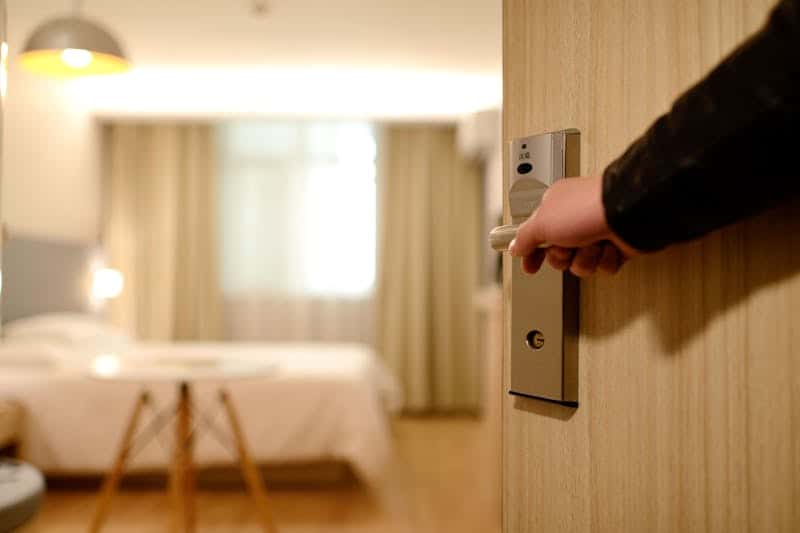
Conclusion
As a hotel guest, you have a reasonable expectation of privacy and security during your stay. While hotel staff generally cannot enter your room without permission, there are certain exceptions, such as emergencies, maintenance issues, or when the room is being checked out.
It’s essential for hotels to have clear policies and procedures in place to protect guest privacy while also ensuring the safety and well-being of all guests and staff.
By understanding your rights, following best practices, and communicating openly with hotel staff, you can help ensure a comfortable and secure stay. Remember, if you ever feel that your privacy has been violated or that unauthorized entry has occurred, don’t hesitate to report it to hotel management immediately.
A respectful and transparent relationship between guests and hotels is key to maintaining a positive and trustworthy experience for all.

